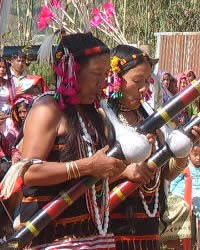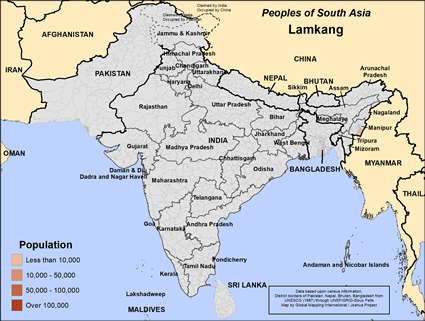Lamkang in India

Photo Source:
Sumshot Khular
|

Map Source:
People Group data: Omid. Map geography: UNESCO / GMI. Map Design: Joshua Project
|
| People Name: | Lamkang |
| Country: | India |
| 10/40 Window: | Yes |
| Population: | 8,000 |
| World Population: | 8,000 |
| Primary Language: | Lamkang |
| Primary Religion: | Christianity |
| Christian Adherents: | 95.18 % |
| Evangelicals: | 0.00 % |
| Scripture: | Complete Bible |
| Ministry Resources: | Yes |
| Jesus Film: | No |
| Audio Recordings: | Yes |
| People Cluster: | South Asia Tribal - other |
| Affinity Bloc: | South Asian Peoples |
| Progress Level: |
|
Introduction / History
The Lamkang tribe is recognized under the Indian constitution as a Scheduled Tribe. Lamkang are one amongst the 16 Naga indigenous tribes of Manipur, India. They have been known by many names. Traditionally, the Lamkang were known as Ksen, which means "red" in Lamkang. In fact, they were called ‘red people' by the neighboring tribes. Lamkangs speak the Lamkaang language.
The Lamkang skills in fishing and canoeing were well known. The villagers themselves assert that the name of their village means ‘boat-maker of drylands', which finds support in the sea products the Lamkang still possess and use, e.g. marine shells, cowries and other kinds of shells used by women for adornment during traditional festivals. Today, the Lamkang people conveniently use the conjoined term Ksen Lamkang to refer to themselves.
In 1888, the Manipur State Government Gazetteer used the language name to name the group, that is, it referred to the people as Lamgang. In the Royal Court Chronicle of the Meitei people of the Imphal Valley, in a treatise called "The Royal Court Chronicles," the Lamkang were referred to as “Lamkang boat-makers” (from Meitei hiroi "boatman" (a compound of hi "boat" + roi "rower")). According to Meitei oral tradition, the Lamkang, who inhabited a forested region in the hills, presented canoe-like boats to the nobility of Manipur, which is where the moniker Hiroi Lamgang originated. They believed that the ancestors of the Lamkang were seafaring people who lived beside a big body of water.
The Lamkang are mostly based in 46 villages spread across Manipur's Chandel District. Additionally, some Lamkang people are settled in the Senapati district of Manipur, and in Dimapur, and Kohima in Nagaland. They are in Chandel and Tengnoupal districts of Manipur state, India. There are few Lamkangs living in Tamu township of Myanmar.
What Are Their Lives Like?
They live simple lives, and they practice swidden (slash and burn) farming and wet field farming. They hunt, fish and forage wild vegetables and mushrooms along with different wild fruits and roots that make their subsistence income.
They are a hospitable and peace-loving people, and they have a fondness for singing and dancing. They have several festivities that they celebrate like the "Totlang Kam," " Dilkoot,""Smul Kpnaak,"and "Chavaan Kumren." Apart from cultural festivals they have several religious observations like Good Friday and Easter Sunday, Christmas and New Year's Day that are celebrated in all the villages. As an oral society, all forms of teaching and learning on culture and traditions are passed down to the next generation orally.
What Are Their Beliefs?
Before they became Christians, they worshiped Kruung Parvaan, the Supreme God of heaven. They practiced the old traditional rituals with the Thimpu people. Today, most Lamkang are believers/followers of Christ, mainly Baptist. There are also Catholics along with small number of Seventh Day Adventists.
What Are Their Needs?
In 2019 the Lamkang Bible was released by the Bibles Society of India (BSI) but there is a great need to study the Bible so they can live their lives out as commanded by God. There is a huge gap to teach the word of God as they lack trained pastors and building trained pastors or local leaders is needed. They lack disciple making/training in their communities.
They lack redemptive change makers to make differences in the community with Christ- centered focus. There is still lack of educational, health and developmental facilities in most Lamkang villages.
Prayer Points
Pray for biblically trained pastors and leaders.
Pray for revival to break out in the Lamkang churches so that they will be on fire for the Great Commission work.
Prayer for young people to read the Bible and be ready to be sent out.
Prayer for trainers to help the local leaders in disciple-making.
Prayer that the Lamkang people will be filled with the fruit of the Holy Spirit.